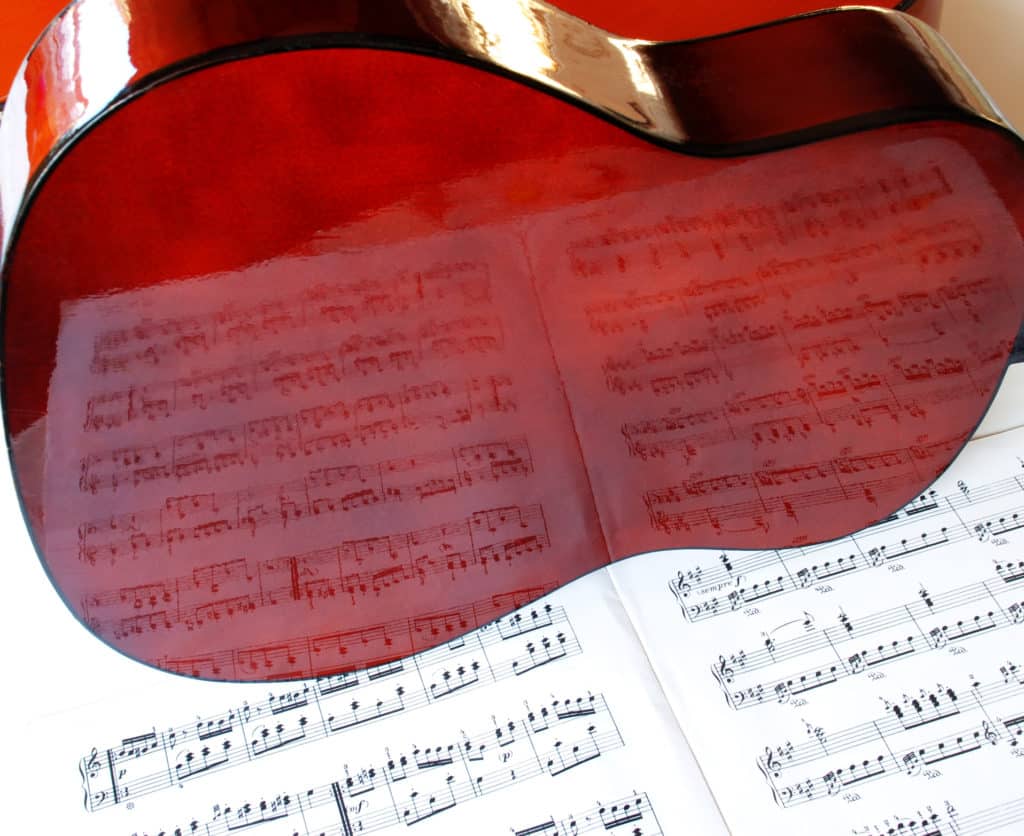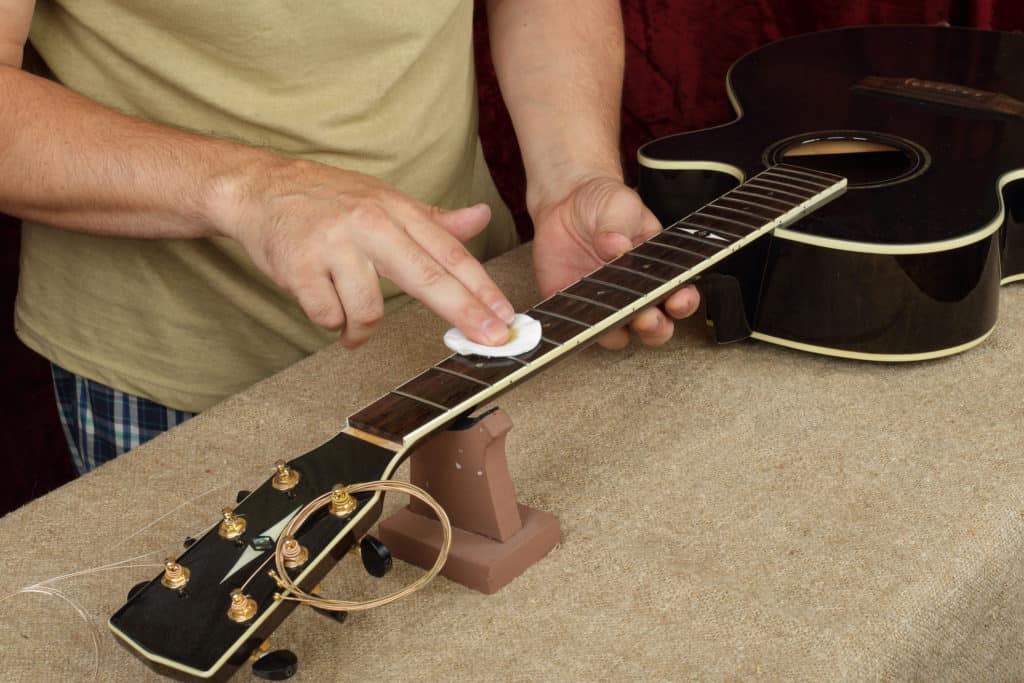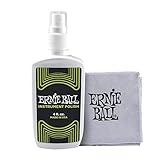When I was a young boy, I developed a strong passion for guitars after I was gifted a J&Z classical acoustic guitar on my eighth birthday. At that time, I had no idea that a guitar needs maintenance and care. I later realized after I bought my second guitar four years later that I actually needed to care for it. I researched a lot of different things and worked through trial and error over the years. One of those things that I did come across was whether I should oil my guitar body and here is what I have found to be the case:
Generally speaking, you should never oil the body of a guitar. You should only oil a guitar body if it is made of unvarnished wood, and this is extremely rare. A varnished guitar body does not need oiling. In fact, oiling a finished guitar body will cause damage, as the solvents in the oil will eat away at the finish. Fretboards on the other hand, are commonly unvarnished and often will require oiling from time to time.
There are a lot of variables to consider when it comes to oiling guitars. The fretboards need oiling if the wood is unvarnished. That brings up questions about what oil to use. In this article, I will cover everything that needs to be said about oiling guitars, recommended oils to use and not use, and finally I will cover what you should be doing to keep your guitar generally clean.
As I have mentioned, you should never oil a guitar body if the wood is varnished. Identifying whether something is varnished or not is as simple as looking at it from an angle and confirming whether it has a shine or not. If the body is varnished, you just need to clean it with a damp cloth and the fretboard with a toothbrush.

Why Oil The Fretboard?
The reason why you oil an unvarnished fretboard, is because it has nothing keeping it from drying it out. A varnished fretboard is shiny and nice to look at, but it also has a practical purpose. That practical purpose is that it keeps the moisture locked into the fretboard. Without this layer of protection, the wood will dry out and crack over time. Therefore, you should oil the fretboard to keep the moisture in the wood and to prevent the fretboard from getting damaged.
When acoustic guitar fretboards get exposed to dry conditions with a relative humidity of less than 45%, they are likely to shrink and crack overtime. Keeping an eye out for signs of dryness, and oiling the fretboard from time to time will protect your guitar from this.
Since the guitar wood dries with time, unfinished wood needs regular oiling with oils that do not have waxes, solvents, or synthetic silicones. This will ensure that the oil does not accumulate grime and dirt that would otherwise get to the guitar strings. Read on to learn about the common oils that you should and should not use.
What Kind of Oil Do You Use For a Fretboard?

There are a number of different oils you can use on your fretboard, but keep in mind you want to stay away from sticky oils. Mineral oils are typically preferred. Stay away from vegetable oils and other oils you find in your kitchen such as olive oil or canola oil. Also, the type of oil depends on the type of wood your guitar is made of, whether it is ebony, rosewood, or maple, among other wood varieties.
Assuming that your guitar fretboard is not varnished, then you should use a recommended oil to keep the wood from cracking. For fretboards, you can use fretboard oil, linseed oil, or mineral oil. However, when using any oil, remember not to overdo it. An important rule of thumb here is that less is more when it comes to oiling a fretboard, no need to pour a lot of oil. One thing to look out for is pooling, if the oil is pooling up on your fretboard then you have applied too much.
Unfinished wood needs care and attention. If the wood dries up, it can cause the fretboard to crack and the guitar will become unplayable.
Can I Use Mineral Oil On My Fretboard?
Mineral oil is a great product to use on any unfinished fretboard, whether the wood is made out of maple, rosewood, or ebony. You may very well have some sitting around your house anyways because it does have a common household use. When applying mineral oil, double-check that it is simply straight mineral oil as the stuff you buy at your local pharmacy often contains scents and other additives. You don’t want to be smelling lavender on your fretboard for the next year or so do you?
Can I Use Lemon Oil On My Fretboard?
Lemon oil is another good option for rosewood and ebony fretboards. There is a lot of debate about lemon oil online and this can easily make you believe lemon oil is a bad idea for cleaning the guitar body. The debate was probably started by somebody who had the idea to press a lemon and then apply the lemon juice straight to their fretboard. Low and behold, that person probably ruined their fretboard, grabbed a keyboard, and began screaming through the roof on Reddit about how bad lemon oil is.
Pure lemon oil, is in fact really bad for a guitar. Pure lemon oil will dry out the wood over time and can break down the adhesive holding your guitar together. Fretboard lemon oil, on the other hand, is a little bit of a misnomer. There is very little actual “lemon oil” in fretboard lemon oil, and it is in fact very good for your guitar’s unfinished fretboard.
Can I Use Baby Oil On My Fretboard?
You should not use baby oil on your fretboard. Baby oil is too thick and hence not a good choice for use on guitars. Instead, you can use pure mineral oil, only if your guitar is made from unfinished rosewood or ebony. Remember, any thick oil can cause grime on the surface of the guitar body and hence is not recommended for cleaning or oiling.
If you would like to read a more detailed description on the issues with baby oil and alternatives for your guitar fretboard, read about it here!
Can I Use Gun Oil On My Fretboard?
Gun oil is made for cleaning lead, gunpowder residues, and for cleaning rust. I have never personally used gun oil on my fretboards and I have seen mixed opinions on the subject. I would suggest that you play it safe and stay away from anything that is not actually made for wood.
Gunstock oil, on the other hand, is made for wood and I would not necessarily advise against it. You will also find a lot of mixed opinions on gunstock oil, but you should be aware that gunstock oil will leave a light varnish on the surface of your fretboard.
Can I Use Olive Oil On My Fretboard?
You should not use olive oil on your guitar body. This is because the oil is sticky and can cause a lot of grime and dirt to accumulate on the fretboard. Olive oil also has a short lifespan and it will go bad on your fretboard. It is also a weak acid, which can cause additional issues with repeated applications.
Can I Use Tung Oil On My Fretboard?
I would not recommend that you use tung oil on the fretboard. Tung oil is recommended by some and disliked by others, however, it is more of a finish than an oil. If you do end up giving it a go, be very cognizant of the amount that you use as it will harden and leave a very thick finish if you apply too much.
How Often Should I Oil My Fretboard?
Oiling the unvarnished fretboard helps to keep the moisture in the wood, especially if you live in a dry weather climate. The frequency of oiling really depends on the climate that you reside in.
For example, if you live in areas of the Southeast where it is known to be extremely humid during the Spring and Summer months, you likely will very rarely if ever find a need to oil your fretboard. On the other hand, if you live on the outskirts of Las Vegas or somewhere else where the weather is as dry as a bone, I would recommend that you stick to a more frequent oiling schedule, once every six months, if not a little more frequently. The frequency you oil will generally depend on the following factors:
- The climate, dry weather can and will cause the wood to warp and crack over time.
- The amount of sweat your hands produce.
- How frequently you play the guitar.
What Can I Clean My Guitar With?
Just because you are sticking to your every “once in a blue moon” oiling schedule does not mean that you are covered in the guitar maintenance department. If you want to make sure that your guitar lasts its full lifetime you also need to keep it clean.
Cleaning your guitar can range from wiping it down with a dry cloth after an every now and then jam session, to wiping the guitar down with distilled white vinegar or guitar polish. If you are interested in a guitar polish, Ernie Ball is something that I have used in the past and I really liked. It’s cheap, effective, and one of the most popular options. Distilled vinegar is an outstanding cleaner that can clean both varnished and unvarnished wood, and it also leaves a nice shine to the guitar. Personally, when I am playing a few times a week I will wipe my guitar down with a dry cloth after every session, and then every two weeks I will really do a deep clean with the vinegar.
- 4 oz. bottle of proprietary guitar polish.
- 12 x 12 inch gray microfiber guitar polish cloth.
- Wipe on, wipe off for fast, easy, effective instrument care.
A word of caution, never use any household cleaners when cleaning your guitar. Household cleaners will eat away at your guitar’s finish and damage it. Another point to remember is that you don’t want to saturate your rag when cleaning your guitar, a lightly dampened rag is sufficient!
Final Thoughts
I hope that this article has helped you understand the ins and outs of oiling your guitar body and fretboard. 99% of the time you should never oil your guitar body, which is why this article focused on the guitar component that you should oil from time to time, your fretboard. It all depends on whether the wood is finished or not, the type of wood, and the type of oil you are applying to the fretboard.
Also, keep in mind that oiling a guitar is not necessarily enough, you should also clean it with a dry cloth after jam sessions, and with an approved cleaner from time to time.

